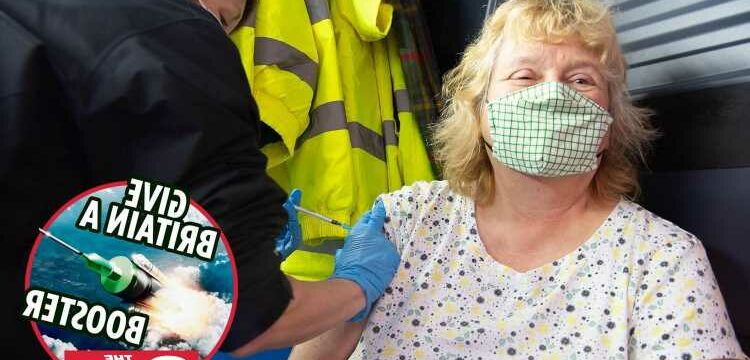MILLIONS of Brits will receive their booster dose of the coronavirus vaccine before Christmas in a bid to protect the nation from the Omicron variant.
But when can you get a booster jab and will you be eligible?
Three cases of the new Omicron variant had already been identified in England – although officials fear that means hundreds could already be infected.
There are more than 150 further infections in the UK already, Government sources have claimed.
And UK labs are said to be probing 225 possible samples of the mutant variant.
The Scottish Government said four of the Covid-19 Omicron variant cases identified in Scotland are in the Lanarkshire area, with two in the Greater Glasgow and Clyde area.
It has reached UK shores less than a week after being reported as a concern in African countries.
The spread in cases has prompted the government to claim they will remain on the 'front foot' in the fight against the variant.
Am I eligible for a booster?
All Brits aged 18-39 can come forward for their booster, the Joint Committee on Vaccination and Immunisation (JCVI) announced.
But they will not be able to have it any less than three months after their second dose.
The NHS will contact you when it's time to come forward for your jab if you're not already eligible.
It comes just weeks after the booster campaign was extended to Brits aged 40 and over in a bid to give an extra immunity boost before the festive season.
Experts hope cutting the gap between the second and third doses of the jab from six to three months will allow the UK to get ahead of the new Covid variant.
Kids aged 12 to 15 will also be offered a second dose of the vaccine, in an attempt to shore up the nation’s immunity in the face of worrying new strain.
Chief of the Medicines and Healthcare products Regulatory Agency (MHRA), June Rainer this afternoon urged people to book in for their jabs.
Vulnerable Brits, for example those at severe risk of Covid, will still be top priority for the jabs and will get theirs before others.
This could mean that younger Brits don't receive a booster until January in order to help the most vulnerable get jabbed.
Prime Minister Boris Johnson at the weekend called on scientists to speed up booster jab rollouts to under-40s amid Omicron fears.
How to book your booster
You can use the national booking service to secure your coronavirus booster slot.
At the start of the month those eligible were told that they could book their slots a month in advance and that they could go to walk-in centres.
Deputy Chief Medical Officer, Professor Jonathan Van Tam said the NHS said they are 'up for the challenge' when it comes to delivering booster vaccines.
He did however say that people who were younger and less vulnerable would be further at the back of the line for the jab.
The NHS is set to roll out guidance on booster jabs and booking in the next few days.
But if you are already eligible for your jab you can head online to the dedicated NHS booking site.
When you book your jab, you’ll only need to select a time and day for one slot – unlike booking the first and second dose when you were asked to book them both at once.
If you have recently had coronavirus then you should wait four weeks before booking your appointment.
To book your appointment you need to click the green “book now” button.
You'll then be asked if you know your NHS number or not.
If you have your NHS number it will make it a little bit faster to book, if not you then have to fill out all of your personal details.
People can also book by calling 119.
Text invites will come from NHSvaccine and will include a link to the NHS website, enabling anyone eligible to book an appointment at a convenient site nearby.
People who have not received their invitation can book an appointment on the NHS website or call 119.
We pay for your stories!
Do you have a story for The Sun news desk?
Email us at [email protected] or call 0207 782 4104. You can WhatsApp us on 07423 720 250. We pay for videos too.
Click here to upload yours.
Click here to get The Sun newspaper delivered for FREE for the next six weeks.
Source: Read Full Article

